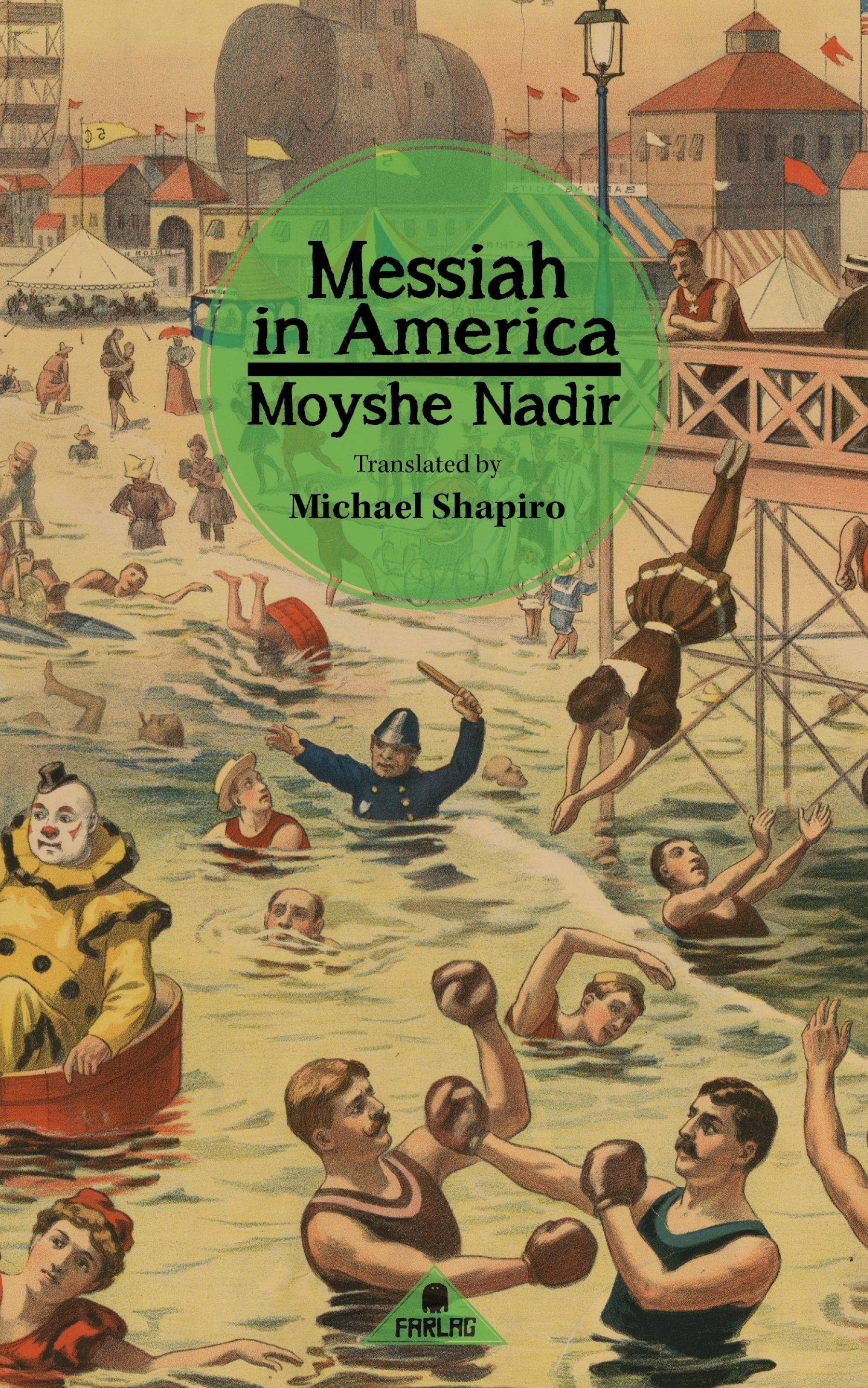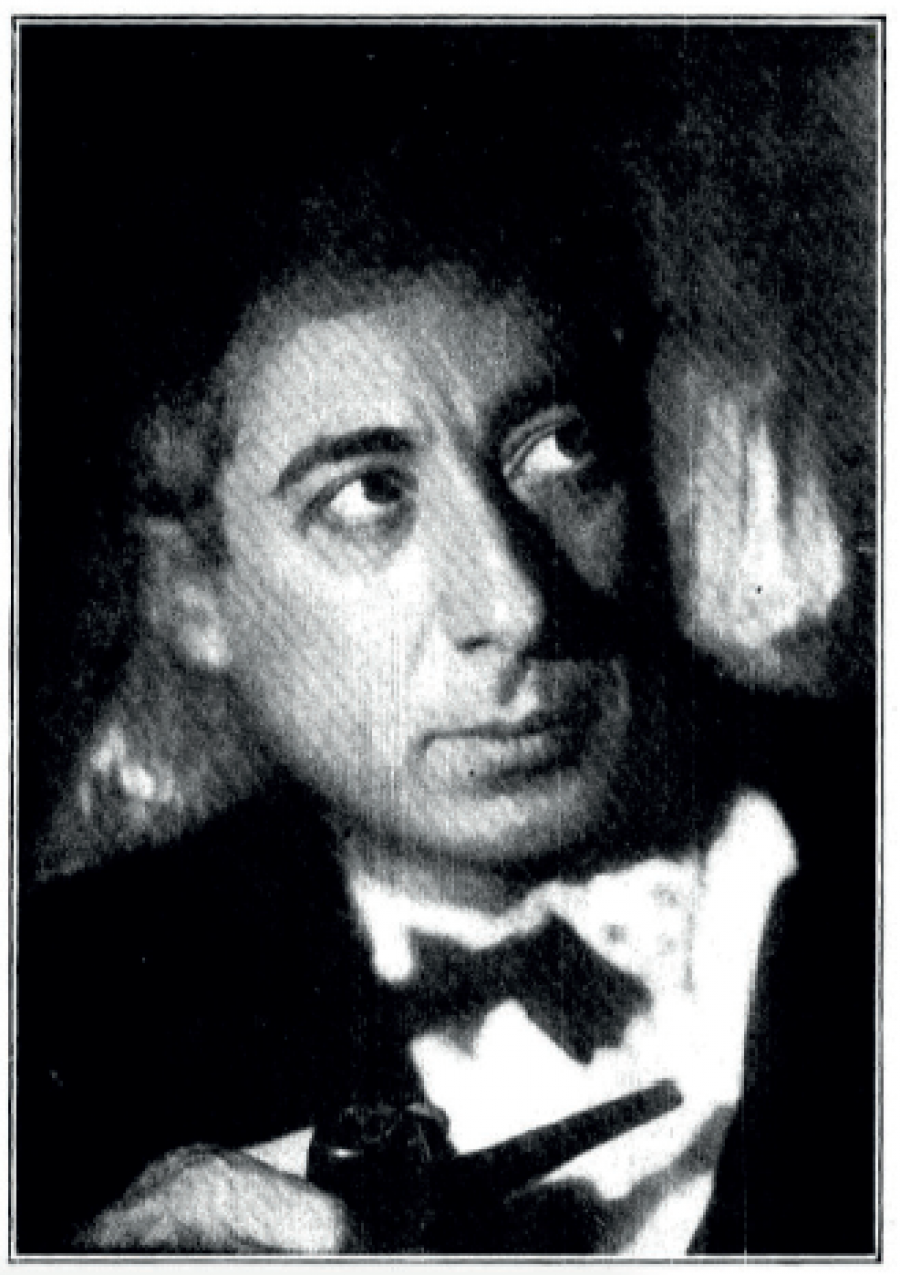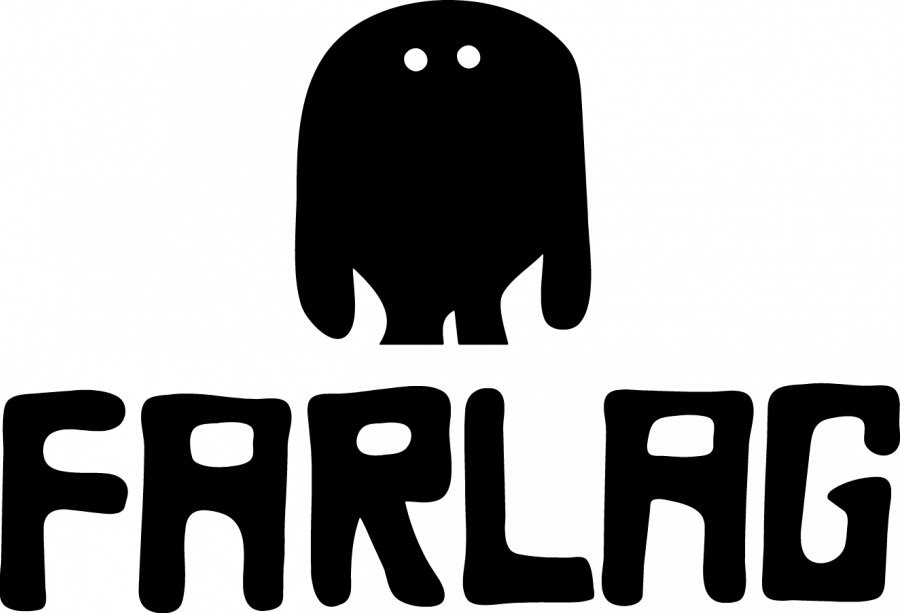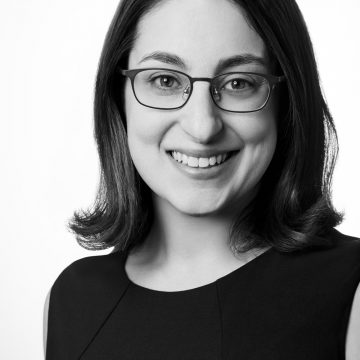
The cover of Farlag Press's recent publication of Michael Shapiro's translation of Moyshe Nadir's Messiah in America.
Interview: A New Translation and a New Press
Debra Caplan, Joel Berkowitz
We were interested to learn recently not only about the publication of a new translation of a noteworthy Yiddish play, Moyshe Nadir’s Meshiekh in amerike (Messiah in America, 1932). In fact, it’s not just the translation that’s new. Michael Shapiro’s English version was recently published by a brand-new publication outlet, Farlag Press, which describes itself as “a small group of translators and literature-lovers interested in spreading new literature using the modest means at our disposal…. We are interested in literature from the crossroads, from the gaps between cultures, from the areas where cultures overlap. We prioritise translations from stateless and minority languages, writers who write in a second language, exiles, immigrants and outsiders.”
The DYTP’s Joel Berkowitz and Debra Caplan recently interviewed Farlag founder Daniel Kennedy and translator Michael Shapiro about the new publication venture and this new English translation of Nadir’s madcap social satire. This interview has been lightly edited by the interviewers.
DYTP: Daniel, this play is one of the first publications of your brand-new venture, Farlag Press. What made you decide to launch a new press? What is the mission of the press and what function do you hope Farlag will serve as a new independent publisher of translations?
Daniel Kennedy: Aside from Messiah in America we’ve also published two issues of Sprachbund, our bilingual literary journal (the odd numbered issues are in English, the even-numbered issues in French). In essence we’re a collective of emerging translators who wanted an outlet for publishing each other’s work. In contrast to other journals which emphasize “bold, new voices from around the world,” our aim is to dredge up old, forgotten voices from nowhere. There’s a particular emphasis on minority languages and diaspora literatures—we’ve published translations from Yiddish, Irish, Western Armenian, Ladino—but also writers of major languages who were wanderers, immigrants and outsiders in various ways (such as Kurt Tucholsky, Annemarie Schwarzenbach, Sayed Kashua, etc.). Our ambition is, in some small way, to bring some obscure gems into the light, and to continue collaborating and experimenting until it stops being fun. As well as English translations, we also intend to publish book-length projects in French too.
DYTP: Michael, what drew you to Messiah in America as a translator?
Michael Shapiro: The humor here is so outrageous, so full of attitude, that I just had to get my hands on it. And there really isn’t a better way to get to terms with a text than to translate it.

Moyshe Nadir
DYTP: How did you both first encounter Messiah in America? What did you think of it when you first encountered it, and did your thoughts on this play change after completing (Michael) and reading (Daniel) this translation?
MS: I learned about Messiah in America (and the Modicut Theatre along with it) from Joel Schechter’s Messiahs of 1933. Translating the play taught me something about satire and the audience. Nadir’s audience—and the audience for Yiddish theatre more generally—had a real desire to be entertained and they were willing to be entertained. Some of the humor is quite broad—for example, the clownish reporters—and the audience was ready share Nadir’s delight in lampooning them. I also came to the conclusion that great satire requires an audience that knows itself well enough to recognize and laugh at itself in the satire mirror. This question of self-recognition is a big deal in the science of animal cognition. A dolphin looking at itself in a mirror recognizes that a dot of red dye is on its own forehead, not on some other dolphin in the mirror. Humans take this as evidence that the dolphin has self-awareness. We need audiences as least as smart as dolphins and crows!
DK: I came across the play in Michael’s translation first, so I only read the Yiddish afterwards. Both versions elicited roughly the same amount of laughter (and cringing and squirming) from me, so I knew it was a good translation and I wanted to try and help bring it out into the world somehow. (An editor’s role is similar to that of a midwife: you get to help, and shep vicarious nakhes [derive pride],but it’s the mother/translator who does all the pushing—Michael was already having contractions by the time I came into the picture.)
DYTP: Messiah in America is the product of a particular time and place in Yiddish culture: the environment of left-wing political theatre in 1930s New York City. Michael, can you situate the play and its author in that environment? Who was Moyshe Nadir, and what sorts of connections and experiences did he have in that world as of the time he wrote the play?
MS: Politics on the Lower East Side spanned a spectrum from Right to Left. “Right” meant you were Socialist; “Left” meant you were Communist. I’ve seen a photo of a large banner high above Union Square strung across the Frayhayt building: VOTE COMMUNIST. This is an America that’s hard to remember. Moyshe Nadir’s friend, the great, great poet, Moyshe-Leyb Halpern, also published in the Frayhayt and I’ve seen estimates that he was read by a million people a week! A poet?! In America?! I think there was a tremendous amount of intellectual and cultural ferment driven both by the dynamics of the Yiddish community and by the fact that capitalism really was in crisis.
Nadir himself had a sneer on him worthy of the young Bob Dylan. He cut a dramatic figure on the Lower East Side. I would like to know more about his (and Halpern’s) time at the Frayhayt. The Frayhayt wasn’t simply something that appeared at the newsstand and you picked it up and read it and threw it away. Many of Nadir’s works, including Messiah in America, were published by Frayhayt Press. The Artef (the Yiddish ensemble company Arbeter Teater Farband, or Workers’ Theatre Collective), which produced Messiah in America, grew out of the Frayhayt Drama Studio, itself the result of an article (!) in the Frayhayt. When was the last time you read a newspaper article and founded a theatre?
Of course, the radicalized present of Nadir and his audience is only half of the story. Nadir—and probably most of his audience—had religious training. Good satire needs collisions. Messiah in America has the collision between the religious frame of reference and the radical frame of reference, the collision between the “old country” and “the golden land,” and the collision between the idea of America and the reality of America.
DYTP: Who was Nadir’s intended audience for Messiah in America? Who is yours? Michael, did questions of audience influence your translation?
MS: You can get a pretty good sense of Nadir’s audience when he addresses them directly in the Prologue:
With fat, salt and cinnamon we’ve cooked a nice stew
To cram down the throats of treyf [unkosher] Bolsheviks like you.
I don’t think I had any clear idea of who my audience was beyond me and my friends. Of course I was aware that modern audiences don’t have the same frame of reference as Moyshe Nadir’s. I had a clearer idea of the audience when it came to end notes. My audience was me, several years earlier. I assumed that if something was new to me within recent years, it was fair game for a footnote.
DYTP: How did Messiah in America fare on stage? What was noteworthy about the production? Did it succeed commercially? Critically? What did critics and (if we know) audiences have to say about it?
MS: It’s interesting that you use the term “commercial.” I haven’t been able to find anything on Messiah’s commercial success, but just to show you how commercial the Artef wasn’t: when they were having a very successful season with 200,000, one of their most popular productions, they closed it because they felt they owed their audience more than one play per season.

DYTP: Michael, do you hope that this translation will be used for theatre productions? What are your thoughts about how Messiah in America would fare onstage today?
MS: I would love to see it produced. I would say that with every sentence, I was looking for (listening for?) something that sounded right, for something that would play well on stage. If I couldn’t hear actors saying it, it was back to the drawing board.
I think there’s an audience for it today. Messiah was produced in this century in English in San Francisco by Joel Schechter, and New Yiddish Rep in New York produced a staged reading of the first act, adapted by Shane Baker. Between the growing interest in Yiddish theater and the growing disgust with one-percenter politics, the potential audience can only have grown since then.
DYTP: Michael, tell us about some of the challenges you faced as a translator grappling with this play. Can you tell us about a passage or scene or two that posed particular problems, and how you addressed them?
MS: There are funny little things that ought to be easy and aren’t. What’s the English for “Oy vey iz mir”? I originally left it in Yiddish, but Daniel objected saying (approximately), “There should be plenty of gags, but the gag shouldn’t be the Yiddish.” He had a convincing point. Of course the literal, “Ah, woe is me” is about the worst thing you could come up with. I asked various colleagues what they said in their languages. I spent more than week thinking about this. The best I could do was, “What a rotten life!”
Another miniature conundrum was the line, “Break a leg,” said in anger. But “Break a leg” means something else in English. It’s what actors tell each other before going on stage. I spent days on this. “Drop dead” was a reasonable choice in terms of meaning, but didn’t feel right to me in terms of rhythm. It took me a while to realize I could give it a different tone, a little bit more of a sneer with, “Yeah. Drop dead.”
One question was the name of “Der Geler Yoykhintshe.” “Gel” can refer to a redhead. It can refer to someone who is no longer a greenhorn. It can also refer to a rotten person. I opted for the latter, calling him “Scoundrel Johnnie.”
Another question we never ultimately satisfied ourselves about is when a “Daytsh” is a German and when is a “Daytsh” an assimilated Jew, though we felt quite confident that when they’re from Kovno [aka Kaunas, Lithuania], they’re not German!
Michael Shapiro in a home-made mask he has been wearing for recent readings of Messiah in America.
DYTP: What do you think makes Messiah in America relevant to readers in 2018? In other words, why publish a new translation of this play now?
MS: First of all, people should read Messiah in America because it’s absolutely hilarious. Second, it’s a real eye-opener. I keep harping on the richness, the outrageousness, the deep creativity of the culture of the Yiddish Lower East Side. Not knowing about Moyshe Nadir is a little bit like not knowing about Bertolt Brecht. Finally, we’re living through really rotten, disgusting, frightening times. This makes it a good time to find out what helped people get through the bad times of the ‘30s.
DK: I find Messiah in America to be uncannily relevant in 2018. It’s disheartening how well satire ages, actually. The excesses of capitalism, the relationship between power and money (a loathsome businessman who dreams of one day becoming president?), racism, misogyny—Nadir has something to say about all of it. It’s rarely subtle, but it packs a real punch.
DYTP: Daniel, can you give us a sneak peek at upcoming publications? Are there particular works of literature, or kinds of works, that you’d especially like to publish?
DK: I can’t say much. There will be a new issue of Sprachbund coming soon and we have a number of French language projects in the works but it’s too early to talk about those …
DYTP: Anything else you’d like to add?
MS: One more thing. I have a funny relationship to the radical Yiddish Lower East Side. Two of those people voting communist on the Lower East Side were my parents. In fact they used this as an excuse to get married; it would get another vote for the Party by making him a naturalized citizen. But by the time I was born, they had moved to Queens, a subway ride and a world away. I was too small to know it, but they had standing plans to flee to Canada if McCarthy came after them. The radical past wasn’t exactly hidden—at least not after you were old enough to be trusted not to blab about it—but it wasn’t talked about either. I only learned recently from a book that my dad and his theater troupe had themselves and their props hoisted into a second-story window to perform for one of the first sit-down strikes in the U.S. So I would bet money that he saw this play and probably met Nadir at least in passing. For me, this play is a look into the stories your parents never tell you.

